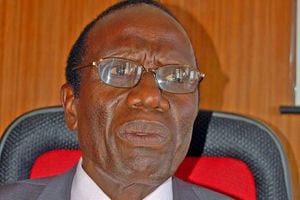
Former Uneb executive director Mathew Bukenya addresses the media at his office in Kampala, in 2006. Bukenya is credited with overseeing significant developments in the administration of national exams in Uganda. PHOTO/FILE
Mathew Bukenya, who was acclaimed as a considerable success during his time at the helm of the Uganda National Examination Board (Uneb), will be laid to rest today at his ancestral home in Masaka District.
Bukenya, a pioneer staff of Uneb when it transitioned from the East African Examinations Council (EAEC) in 1980, died last Sunday. Before leaving Uneb in March of 2016, Bukenya had served as the executive secretary of the examinations body for 21 years (January 17, 1996 to March 31, 2016). Having taken on the mantle from Basil Kiwanuka, Bukenya passed it on to David Livingstone Ongom upon his retirement in March 2016.
Before being appointed the executive secretary, Bukenya served as Uneb’s chief finance and administration officer from 1981 to 1988. He then acted as a senior deputy secretary from 1989 to 1991. He then retired from public service in 1995 and was working as an educator when he was tapped by his former employer in 1996.
During his leadership, Bukenya oversaw significant developments in the administration of national exams in Uganda. He contributed to the integrity and improvement of the country’s examination processes.
Bukenya’s time at Uneb was marked by both achievements and challenges. He was known for his commitment to maintaining the credibility of national examinations. His tenure was, however, not without controversy. Uneb faced significant challenges on his watch, including examination malpractices.
His team, nevertheless, worked tirelessly to combat these issues.
President Museveni extended his contract in 2014, despite reaching the mandatory retirement age for public sector employees, a decision that led to disputes and the resignation of the then Uneb chairman, Fagil Mandy. This extension was necessary to ensure a smooth transition until a suitable successor could be found.
Upon his retirement in 2016, Bukenya expressed gratitude for the support he received from the government, various educational institutions, and the public.
Bukenya’s last public appearance was last July at the opening of new stores and an office block for Uneb in Kyambogo, Kampala, where he was seen looking weak and being assisted as he walked.
Mr Daniel Odongo, Uneb’s current executive director, said the late Bukenya will fondly be remembered for his exemplary leadership.
During Bukenya’s reign, a number of developments took place, including the construction of the Uneb offices in Kyambogo, and modernisation of the Ntinda headquarters. On his watch, Uneb built the capacity to start printing examinations in-house. Previously, the examinations were printed from the United Kingdom.
Bukenya also instituted several measures to curb examination malpractices. He also established a fully-fledged ICT department that came with innovation, including the method of accessing results via SMS.
“Uneb and the entire education sector have lost an icon who made a mark during his time of service,” Mr Odongo said of the man who, in many respects, became an institution.
Dr John Chrysostom Muyingo, the junior Education minister, described Bukenya as a dedicated servant whose legacy is firmly engraved in Uganda’s educational history.
